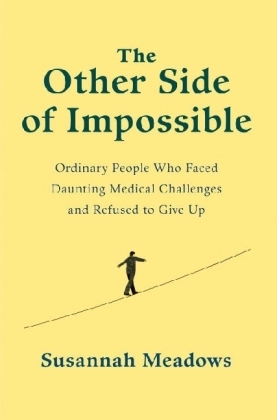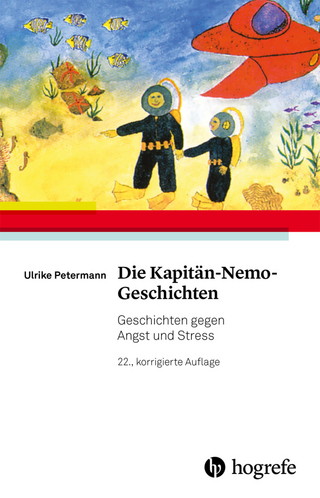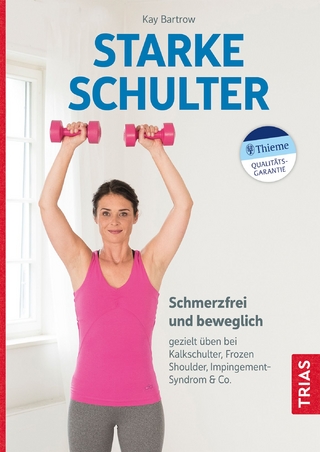
The Other Side of Impossible
Random House (Verlag)
978-0-399-59124-2 (ISBN)
Their adventures take us to the outer frontiers of medical science and cutting-edge complementary therapies, as Meadows explores research into the mind's potential to heal the body, the possible role food may play in reversing disease, the power of agency, perseverance, and hope-and more.
When journalist Susannah Meadows noticed her three-year-old son, Shepherd, shying away from soccer practice, she had no idea it was the first sign of juvenile idiopathic arthritis. The diagnosis was the first step of a long journey, physically painful for Shepherd and emotionally wrenching for Susannah and her family. But they pressed on, and using a combination of traditional and complementary medicine they beat the disease, and the odds.
Meadows chronicles her own story, and takes you into the lives of other remarkable people, exploring their heartbreaks and triumphs. One boy who has severe food allergies undergoes an unconventional therapy and is soon eating everything. An organic farmer in Washington State tries to solve the puzzle of her daughter's epileptic seizures. A physician with MS creates her own combination of treatments and goes from a wheelchair to riding a bike again. A child diagnosed with ADHD refuses to take medication and instead improves his life, and the life of his family, after changing his diet. Other families take on rheumatoid arthritis and autistic behaviors.
Meadows includes new information about traditional and nontraditional medicine and the latest science on how the health of our gut bacteria is connected to wellness-and how the right foods play a key role in helping this microscopic population thrive. She also talks with scientists who study the traits and circumstances that may make some people keep going when others feel helpless. These researchers are illuminating the psychology of healing-how the mind, and asserting control over your body and health, can play a part in recovery.
Fascinating, moving, and profoundly inspiring, The Other Side of Impossible gives us people driven by love, desperation, and astonishing resolve-a community of the defiant who share an extraordinary talent for hope and for fighting the battle for healing in today's world and tomorrow's.
Susannah Meadows is a former senior writer for Newsweek. She has been a frequent contributor to The New York Times, writing a column for the Arts section about books. During her career she has covered the 2004 presidential campaign, the aftermath of 9/11, and the Duke lacrosse scandal, among many other stories. She has appeared on CBS This Morning, CNN, MSNBC, Fox News, ESPN, Charlie Rose, and The Brian Lehrer Show. She lives with her husband and twin sons in Brooklyn.
"[Meadows] has compiled compelling stories about people who faced and ultimately surmounted daunting medical challenges. . . . The families' ventures into a realm that some would call quackery were typically inspired by love, desperation and hope, and were fueled by irrepressible grit and determination to find solutions to debilitating health problems that defied the best that conventional medicine could offer. Their stories left me in awe of their persistence against formidable odds."-The New York Times
"The stories featured in this book are really remarkable-a child making a full recovery from a painful illness, a woman confined to a wheelchair walking again-and all because they wouldn't stop looking for answers."-Good Morning America
"This is a book of hope. . . . An amazing book for everyone."-Fox & Friends
"At the age of three, the author's son Shepherd was diagnosed with juvenile arthritis. When Western medicine didn't help, Meadows, a journalist, found a special diet-no gluten, no dairy-that did. For this book she found other families who, as she writes, had similarly explored 'the wilds of unfinished science.'"-Newsday
"[Meadows's] purpose is to 'suggest potential targets for new research,' and she does so with writing that's compelling and fair. . . . This is a terrific book for those who need encouragement to take control of their diagnoses, and for their physicians and families."-Publishers Weekly
"Throughout these tales, a common attitude binds people together: hope. . . . What cannot be refuted are the will power, perseverance, and hopefulness of the patients and families profiled here."-Booklist
"Can eating the right food play a major role in healing medical problems? . . . Encouraging, honest information and real-life cases that show the role food can play in healing the body."-Kirkus Reviews
"[The Other Side of Impossible] introduces readers to courageous patients, parents seeking help for their children, and scientists searching for cures and explanations. . . . The author highlights the importance of persistence, hope, and research when facing difficult medical situations."-Library Journal
"In this affecting and illuminating book, Susannah Meadows emerges as the kind of sound, sensible, and invaluable friend you want by your side when medical disaster strikes. She brings a strong grasp of science, a writerly sensibility, and a good heart to the difficult subject of the present and future of healthcare. If you love someone, read The Other Side of Impossible."-Jon Meacham
"I laughed out loud more than once, choked up more than twice, and generally marveled at the lovely humanity and sharp mind at work. This extremely useful guide to never giving up is journalism at its most responsible, intelligent, and compassionate."-Kelly Corrigan
"The Other Side of Impossible is an amazing book-insightful, compassionate, and quite possibly life-changing."-Curtis Sittenfeld
1
Shepherd's Story, Part 1
The Leap
What if we'd never met Char?
-Darin and me
When my son Shepherd was three years old, he and his twin brother Beau took soccer lessons for the first time. They were so excited the night before their first practice that they slept in their uniforms-a purple T-shirt with a yellow star kicking the ball with one of its points. But when we got to the field the next day, Shepherd's enthusiasm evaporated. While Beau and the other kids zigzagged around the cones, Shepherd stood still and looked bewildered. When it was his turn to kick the ball, he seemed lost. After fifteen minutes, he walked off the field and sat down in my lap, saying he was too tired to play. We watched the other kids, and I pointed out to him the drills I thought he might enjoy, the ones that Beau was charging through. But Shepherd refused to go back to the field.
His reaction didn't concern me much-he was three, after all, and I already thought of him, in the way that parents tend to categorize their children even as we tell ourselves we shouldn't, as not that interested in sports.
My husband, Darin, and I had recently noticed that Shepherd occasionally walked with a limp, but it was faint enough that sometimes when you looked for it, it was gone. Faint enough-though it seems incredible now-that we didn't connect it to his reluctance on the field.
I assumed that Shepherd would warm to his soccer lessons the next time around. He and Beau still donned their jerseys at bedtime and talked each night about "soccer school" at the dinner table. But the following Saturday, Shepherd broke into tears the moment he started to run.
That week we saw our pediatrician, who referred us to an orthopedist. When no injury showed up on the X-ray, the doctor said that arthritis was most likely the issue. Arthritis in a three-year-old? It sounded more odd than alarming at first, but over the next few weeks, as we waited to see the next specialist, we watched Shepherd spend more and more time on the couch. His stiff-legged walk became more pronounced, though he claimed that it was just an imitation. "I'm a penguin," he would say. Then he started having trouble getting out of bed.
A month after our first appointment, we went to see Dr. Philip Kahn, a pediatric rheumatologist at NYU Langone Medical Center, who gave Shepherd a diagnosis of juvenile idiopathic arthritis.
JIA is an autoimmune disease. It causes painful swelling in the joints. It can lead to stunted growth, disability, and, rarely, blindness.
When Dr. Kahn tested his joints, Shepherd denied that it hurt even as he teared up in pain. Our son was stoic, Dr. Kahn said, as the kids he treated often were. Shepherd turned out to have arthritis in both knees and both wrists, as well as in his left shoulder and elbow. Many months later a particular memory came back to me, its attendant mother's guilt harsh despite the passage of time: We'd bribed him to go to that last practice with the promise of ice cream.
Before driving home from the appointment, all four of us stopped for lunch at a hummus place that Dr. Kahn had recommended. We sat outside on the sidewalk, and Darin and I pretended that we were celebrating. This is great news, we told Shepherd. Now that we know what's wrong, you can take medicine that will make you feel better. Darin remembered thinking that we were lying to him, but he was trying to be more optimistic than he felt, for Shepherd's sake and for mine. Shepherd barely ate his lunch.
When we got home, I called my sister, Rae. She already knew that overwhelmed feeling of getting a child's diagnosis; she'd been through it with her daughter, who had severe asthma and fourteen food allergies. Rae talked about how that moment when you receive a diagnosis like this, for your child, eclipses everything. She tried to reassure me that if an illness isn't life-threatening, the fear eventually d
| Erscheinungsdatum | 22.04.2017 |
|---|---|
| Sprache | englisch |
| Maße | 181 x 235 mm |
| Themenwelt | Literatur ► Romane / Erzählungen |
| Sachbuch/Ratgeber ► Gesundheit / Leben / Psychologie ► Krankheiten / Heilverfahren | |
| Medizin / Pharmazie | |
| Schlagworte | ADHD • allergy • alternative diet • Alternative medicine • Arthritis • Autism • autoimmune disease • Bacteria • children's allergies • Cognitive Behavioral Therapy • complementary medicine • diet • Englisch; Biografien/Erinnerungen • Epilepsy • Family relationships • fecal transplant • Food Allergies • gluten-free • gut health • Healing • Health • inflammation • Krankheit; Erfahrungsberichte • Medical conditions • medical memoir • medical success stories • microbiome • Mindfulness • Multiple Sclerosis • non-traditional medicine • paleo diet • parenting • Probiotics • Rheumatoid Arthritis • Self Help • Traditional medicine |
| ISBN-10 | 0-399-59124-9 / 0399591249 |
| ISBN-13 | 978-0-399-59124-2 / 9780399591242 |
| Zustand | Neuware |
| Haben Sie eine Frage zum Produkt? |
aus dem Bereich


